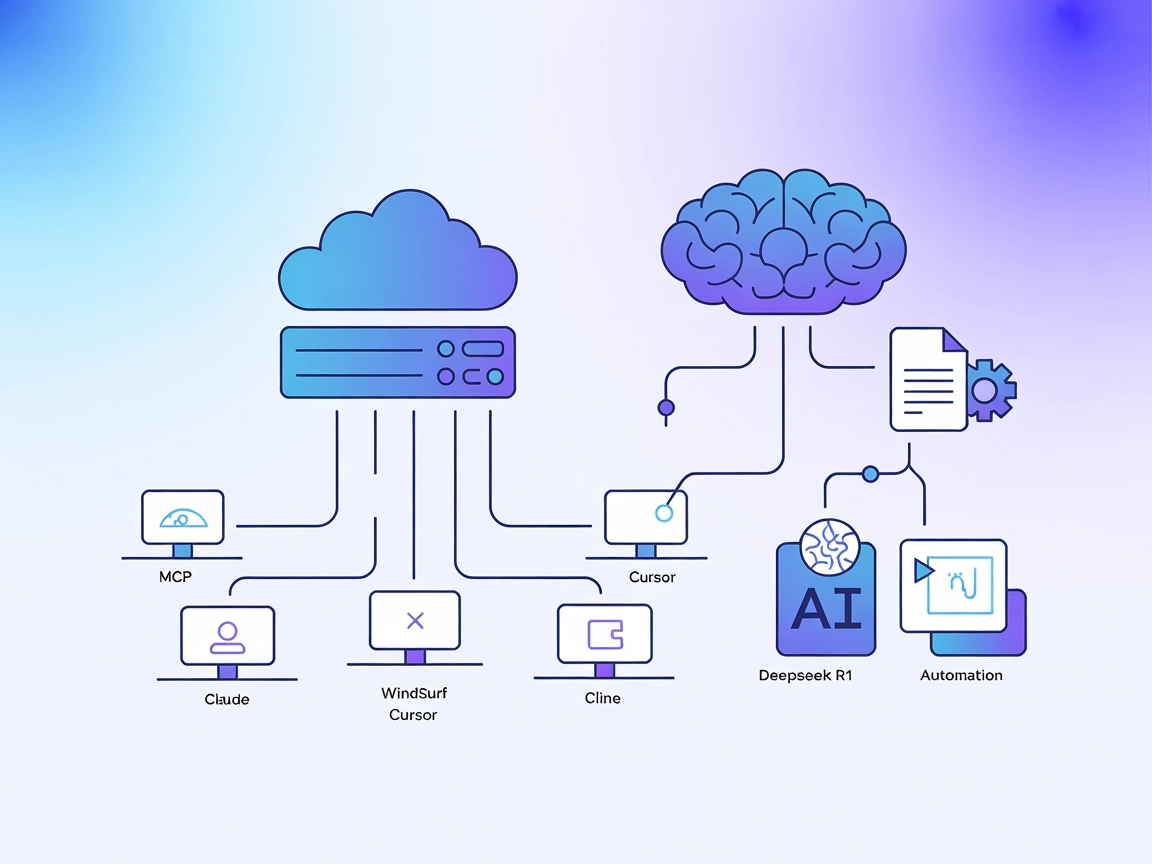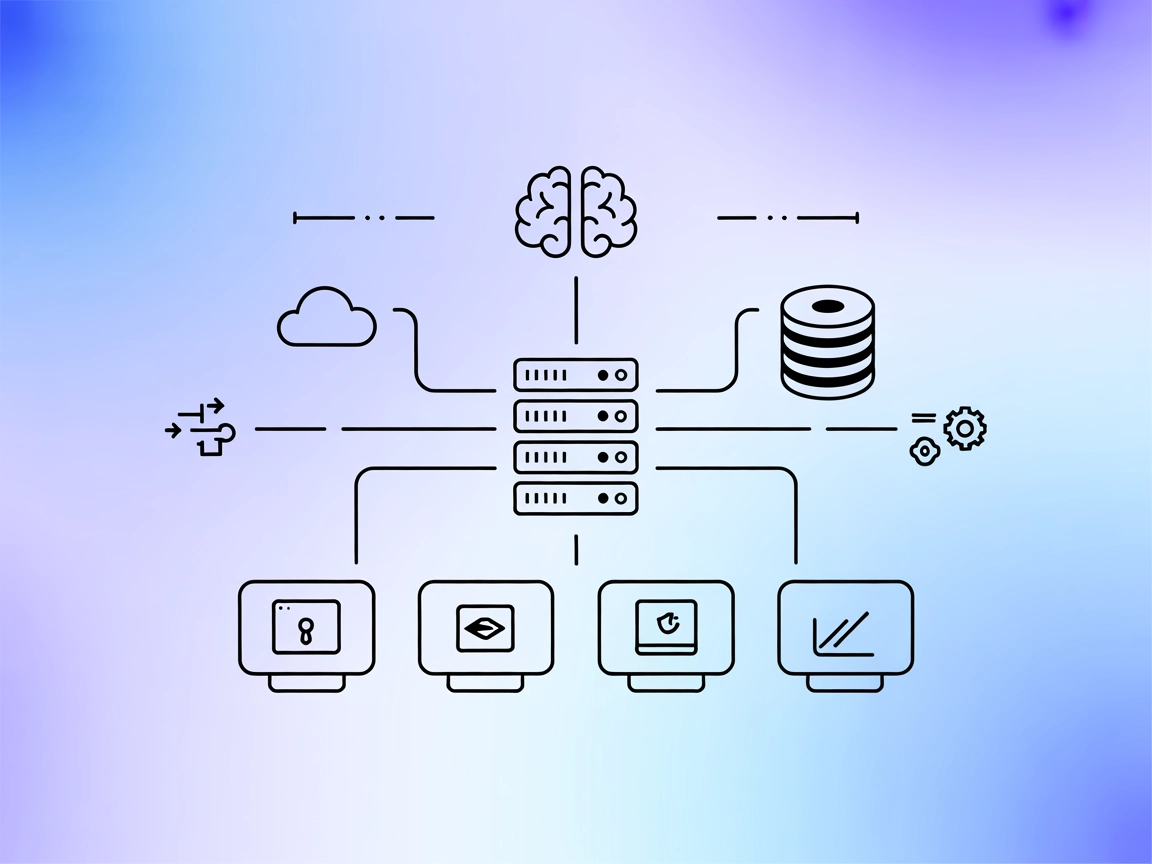
DeepSeek MCP Server
The DeepSeek MCP Server acts as a secure proxy, connecting DeepSeek’s advanced language models to MCP-compatible applications like Claude Desktop or FlowHunt, e...

Integrate DeepSeek’s high-context, reasoning-optimized models into your AI workflows with the Deepseek R1 MCP Server for advanced language tasks and automation.
FlowHunt provides an additional security layer between your internal systems and AI tools, giving you granular control over which tools are accessible from your MCP servers. MCP servers hosted in our infrastructure can be seamlessly integrated with FlowHunt's chatbot as well as popular AI platforms like ChatGPT, Claude, and various AI editors.
The Deepseek R1 MCP Server is a Model Context Protocol (MCP) server implementation designed to connect Claude Desktop with DeepSeek’s advanced language models, such as Deepseek R1 and DeepSeek V3. By acting as a bridge between AI assistants and DeepSeek’s powerful reasoning-optimized models (featuring an 8192-token context window), this server enables AI agents to perform enhanced natural language understanding and generation tasks. Developers can leverage the Deepseek R1 MCP Server to integrate these models seamlessly into their workflows, facilitating advanced text generation, reasoning, and interaction with external data sources or APIs within supported platforms. The implementation focuses on providing stable, reliable, and efficient integration using Node.js/TypeScript for optimal compatibility and type safety.
No prompt templates are documented in the repository.
No explicit MCP resources are documented in the repository.
git clone https://github.com/66julienmartin/MCP-server-Deepseek_R1.git
cd deepseek-r1-mcp
npm install
.env.exemple to .env and set your DeepSeek API key.{
"mcpServers": {
"deepseek_r1": {
"command": "node",
"args": ["/path/to/deepseek-r1-mcp/build/index.js"],
"env": {
"DEEPSEEK_API_KEY": "your-api-key"
}
}
}
}
{
"mcpServers": {
"deepseek_r1": {
"command": "node",
"args": ["/path/to/deepseek-r1-mcp/build/index.js"],
"env": {
"DEEPSEEK_API_KEY": "your-api-key"
}
}
}
}
{
"mcpServers": {
"deepseek_r1": {
"command": "node",
"args": ["/path/to/deepseek-r1-mcp/build/index.js"],
"env": {
"DEEPSEEK_API_KEY": "your-api-key"
}
}
}
}
{
"mcpServers": {
"deepseek_r1": {
"command": "node",
"args": ["/path/to/deepseek-r1-mcp/build/index.js"],
"env": {
"DEEPSEEK_API_KEY": "your-api-key"
}
}
}
}
Use environment variables in your configuration to keep API keys secure:
{
"mcpServers": {
"deepseek_r1": {
"command": "node",
"args": ["/path/to/deepseek-r1-mcp/build/index.js"],
"env": {
"DEEPSEEK_API_KEY": "your-api-key"
}
}
}
}
Using MCP in FlowHunt
To integrate MCP servers into your FlowHunt workflow, start by adding the MCP component to your flow and connecting it to your AI agent:

Click on the MCP component to open the configuration panel. In the system MCP configuration section, insert your MCP server details using this JSON format:
{
"deepseek_r1": {
"transport": "streamable_http",
"url": "https://yourmcpserver.example/pathtothemcp/url"
}
}
Once configured, the AI agent is now able to use this MCP as a tool with access to all its functions and capabilities. Remember to change “deepseek_r1” to whatever the actual name of your MCP server is and replace the URL with your own MCP server URL.
| Section | Availability | Details/Notes |
|---|---|---|
| Overview | ✅ | |
| List of Prompts | ⛔ | No prompt templates documented |
| List of Resources | ⛔ | No explicit MCP resources documented |
| List of Tools | ✅ | Advanced text generation tool |
| Securing API Keys | ✅ | Use env variables in config |
| Sampling Support (less important in evaluation) | ⛔ | Not documented |
| Supports Roots | ⛔ | Not documented |
Based on the available documentation, the Deepseek R1 MCP Server provides a clean, focused implementation that is easy to configure and use, but lacks documentation for prompts, resources, or advanced MCP features like roots and sampling. This makes it highly practical for text generation, but less feature-rich for complex workflows.
| Has a LICENSE | ✅ (MIT) |
|---|---|
| Has at least one tool | ✅ |
| Number of Forks | 12 |
| Number of Stars | 58 |
It’s a Model Context Protocol (MCP) server that acts as a bridge between Claude Desktop (or other platforms) and DeepSeek’s advanced language models (R1, V3), enabling enhanced text generation, reasoning, and automation in your AI workflows.
The server supports Deepseek R1 and DeepSeek V3—both models are optimized for large context windows and complex reasoning tasks.
Use cases include advanced text generation (long-form, technical, or creative), logic-heavy reasoning, seamless AI assistant enhancement in Claude Desktop, and automating content creation or knowledge management via API.
Always use environment variables in your MCP server configuration to prevent accidental exposure of your DeepSeek API key.
No prompt templates or explicit MCP resources are documented in the repository; the server is focused on direct model access and integration.
DeepSeek R1 offers an 8192-token context window, enabling the handling of lengthy and complex tasks.
Yes, it’s MIT licensed and available on GitHub.
Unlock advanced text generation and reasoning by connecting FlowHunt or Claude Desktop to DeepSeek R1’s powerful models. Start building smarter workflows today.

The DeepSeek MCP Server acts as a secure proxy, connecting DeepSeek’s advanced language models to MCP-compatible applications like Claude Desktop or FlowHunt, e...

The DeepSeek MCP Server integrates DeepSeek's advanced language models with MCP-compatible applications, providing secure, anonymized API access and enabling sc...

Deepseek Thinker MCP Server integrates Deepseek model reasoning into MCP-enabled AI clients like Claude Desktop, providing advanced chain-of-thought outputs for...
Cookie Consent
We use cookies to enhance your browsing experience and analyze our traffic. See our privacy policy.